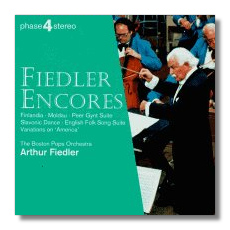
The Internet's Premier Classical Music Source
Related Links
- Latest Reviews
- More Reviews
-
By Composer
-
Collections
DVD & Blu-ray
Books
Concert Reviews
Articles/Interviews
Software
Audio
Search Amazon
Recommended Links
Site News
 CD Review
CD Review
Phase Four Releases

Fiedler Encores
- Jean Sibelius: Finlandia
- Edvard Grieg: Peer Gynt Suite
- Antonín Dvořák: Slavonic Dance in C
- Bedřich Smetana: Vltava
- Ralph Vaughan Williams: English Folk Song Suite
- Ives/Schuman: Variations on America
Boston Pops/Arthur Fiedler
London "Phase Four" 448952-2

- Antonín Dvořák: Symphony #9 "From the New World"
- Zoltán Kodály: Háry Janos Suite *
New Philharmonia/Antál Doráti
* Netherlands Radio Philharmonic Orchestra/Antál Doráti
London "Phase Four" 448947-2
The Fielder CD is oddly disappointing. Maybe I just expected more from this source. The performances, however, are too literal and metronomic for my tastes. I can think of other recordings by Stokowski, Barbirolli, and Fiedler himself that are better. Sorry.
The next disc, however, is a winner in every way. Anatl Doráti was one of many conductors in this century who never attained quite the status of a Stokowski or Karajan. In his own way, however, he was one of the better conductors. His work, towards the end of his life, with the Detroit Symphony was exemplary. With that orchestra he recorded one of the finest Grand Canyon Suites ever, coupled with an equally fine Porgy and Bess. In the late 50s and early 60s he made some spectacular recordings for Mercury. In fact, one of my favorite recordings of the Háry Janos is from that era with him conducting the Minneapolis Symphony. He recorded all of the Haydn Symphonies with an expatriate Hungarian orchestra on the London/Decca label. He might well be the first conductor to accomplish that feat. He studied with Kodály and Bartók as a young man.
My first recording of the Dvořák "From the New World" was a two LP set that included a 1927 recording with a 1973 one by the same conductor. At the time the name Leopold Stokowski was little more than that to me. Stokowski's is still among my favorite recordings, but he omits the first movement repeat and I enjoy the extra opportunity to listen to any Dvořák, but Stokowski imbues the piece with a youthful exuberance not found in other recordings.
The Doráti recording of the Dvořák 9th is the real thing. Exposition repeat is observed in the first movement and it has all the panache of a Stokowski recording to boot. The performance is idiomatic, the sound is warm and beautiful. Where drama is called for Doráti delivers. I listened to the largo on several occasions, just by itself, because the experience was so moving. I would rank this among the top five recordings of this piece I have heard. As I listened I kept finding myself experiencing new insights into this old war horse, little details made apparent by the Phase 4 recording.
I know there are those listeners that find the Phase 4 sound gimmicky. I am not one of them. Some of the first LPs I bought were Phase 4 recordings and I have always found their sound to be full and rich with plenty of bass and body. It was while recording using the Phase 4 techniques that Stokowski opined that one day it would be possible to make recordings that sounded better than live concert performances.
The Háry Janos is also idiomatic. Doráti's recording on Mercury has always been a favorite of mine. I was particularly pleased with the cimbalom playing on that disc. The playing on this disc is every bit as good, but a little more recessed into the orchestral fabric. The sound on this disc, however, is far warmer. Generally I found Mercury recordings too dry for my liking, and this London disc solves that problem in spades.
So, while I was personally disappointed with the Fiedler disc, this Doráti one should be one everyone's want list. It would certainly be one of the top ten records I have listened to in 1996.
Copyright © 1995, Robert Stumpf II


















